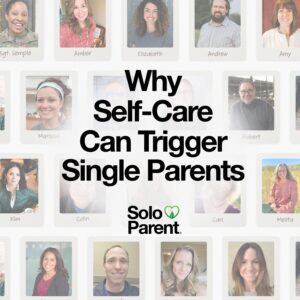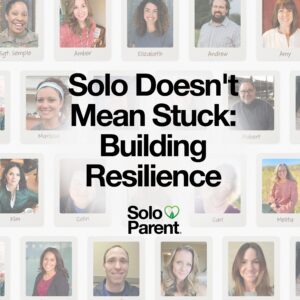Some seasons of single parenting feel like you’re sprinting a marathon you never signed up for. You wake up already exhausted, decisions feel impossible, and the smallest tasks, like answering an email or folding laundry, can feel crushing. That’s survival mode. And while it helps us get through moments of crisis, living there for too long can leave us disconnected from joy, frozen in indecision, and unable to rest.
Key Insights from This Episode
- Survival mode is your body’s way of protecting you, but it doesn’t always tell the truth.
- Self-awareness and grace interrupt the cycle.
- Resilience grows through compassion and surrender.
What makes survival mode so tricky is how normal it begins to feel. For many single parents, it’s not just a season, it becomes the default setting. But as Amber Fuller, a counselor with a Masters in Marriage and Family Therapy (MMFT), explains, survival mode is more than a feeling. It’s our nervous system stuck in overdrive, reacting to old trauma or ongoing stress as if danger were right around the corner. Recognizing this pattern is the first step toward building resilience.
When Elizabeth, a single parent, described her freeze response, she admitted, “Sometimes I just want to feel numb, curl up in a ball, and stop feeling altogether.” That’s survival mode at work. It can manifest as hyperactivity, racing thoughts, jittery energy, or as shutting down, scrolling endlessly while your body still hums with tension. Neither is wrong. Both are your system’s attempt to keep you alive.
But survival mode isn’t the same as living. Amber shared how even hearing the word “calendar” could spike her anxiety, a leftover imprint from years of juggling too much. “I immediately feel like I might miss something,” she said. This is the effect of pathways carved into our brains by prolonged stress. The good news? Neuroplasticity means new pathways can be formed. With practice, the brain can literally learn a new way forward.
Survival mode is your body’s way of protecting you, but it doesn’t always tell the truth.
Past trauma, constant stress, or even a date on the calendar can trick your nervous system into believing you’re in danger, when in reality you’re safe.
That’s where grace comes in. Elizabeth reminded herself of one phrase: “You are having a normal reaction to an abnormal situation.” For single parents carrying more than one person was ever meant to bear, this reminder releases shame. Of course you feel on edge. Of course your body reacts. You’re human, not superhuman.
Self-awareness and grace interrupt the cycle.
Naming what you’re experiencing and speaking kindness to yourself dismantles shame and opens space for healing. Instead of pushing harder or numbing out, awareness gives you permission to pause, breathe, and remember that your body is doing what it was designed to do.
And this is where surrender plays a role. Robert admitted, “I don’t know how people go through being a single parent without God. For me, surrender was the only way through survival mode.” Choosing to release self-reliance, even for a moment, can interrupt the endless pressure to prove you’re strong enough.
Resilience grows through compassion and surrender.
When you let yourself rest, take the easy path when possible, and lean on safe people, or God, you begin to rewire your body and heart for peace instead of panic.
Practical tools can also help:
- Wrapping yourself in a warm blanket to calm your nervous system.
- Talking out loud to a safe friend, even if you don’t want solutions, just relief from carrying it alone.
- Naming the truth: “I’m safe right now.”
- Giving yourself permission to take the easy route instead of scaling mountains in your weakest moments.
Over time, these small acts create new pathways of safety and calm. And resilience, the ability to bend without breaking, takes root.
Listener Question
“Do you have any tips for keeping the house clean with zero time or energy?”
Robert admitted that for him, the first step was letting go of the expectation of spotless perfection. “Start at one end of the house and move forward,” he suggested, “instead of trying to tackle everything at once.”
Elizabeth added a modern twist: “I actually asked ChatGPT to create a step-by-step cleaning list for my house. It broke it down into small, doable tasks. It was amazing.”
Amber emphasized the importance of small decisions: “Clutter is really just deferred decisions. If you touch things once, mail, laundry, toys, you cut down on the overwhelm.”
And perhaps most importantly, get kids involved. Even small chores teach responsibility and lighten your load.
Stay Connected + Get Support
We want to answer any Solo Parent questions you may have. Submit your listener questions HERE.
Additional Resources:



